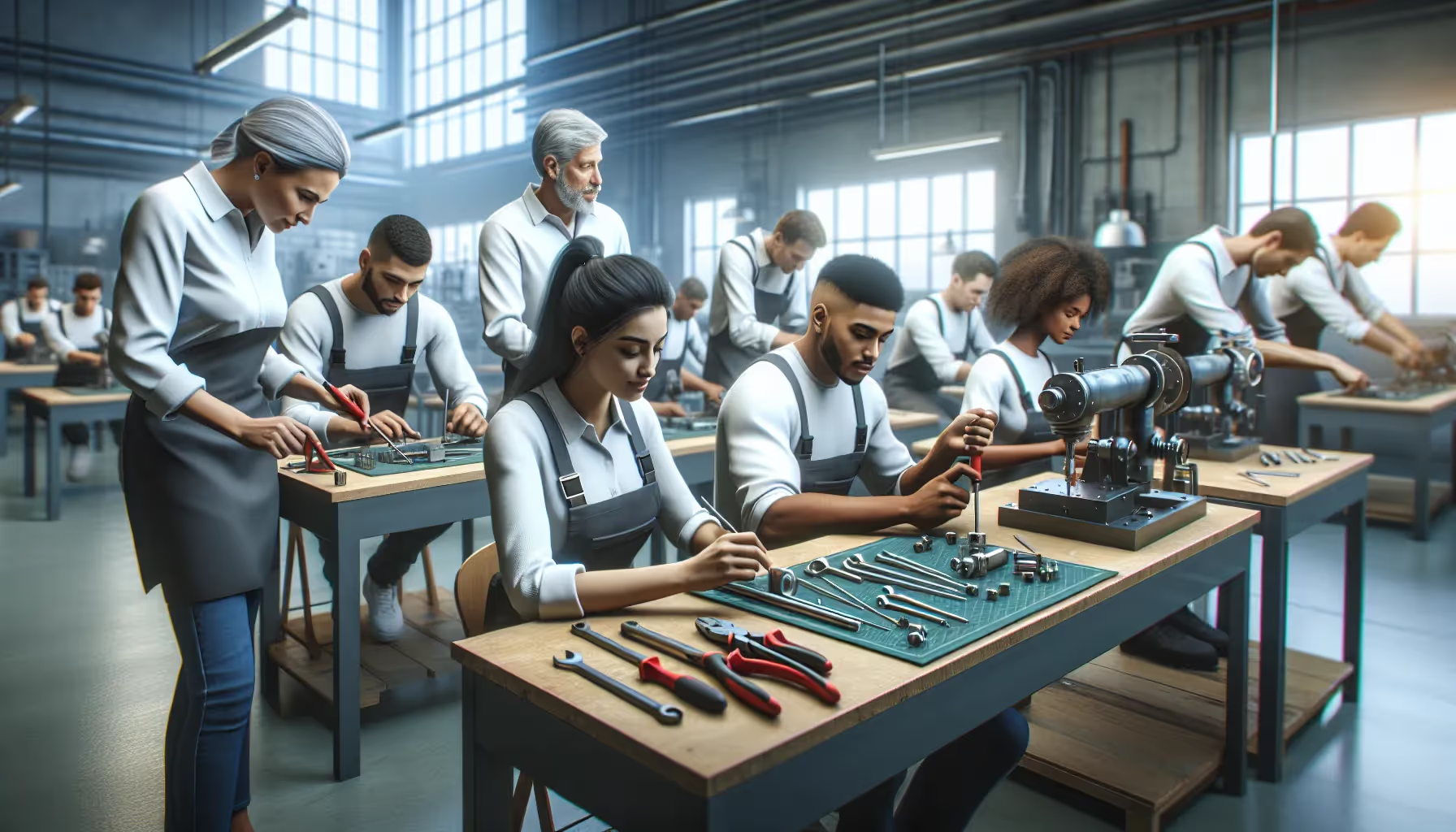Key Takeaways
- Formal Education is Essential: Approximately 70% of jobs in technical fields require post-secondary education, highlighting the critical role structured learning plays in technician development.
- Skill Development Framework: Technician development involves acquiring a combination of theoretical knowledge and practical skills through formal education, certifications, and hands-on training.
- Value of Certifications and Degrees: Formal qualifications enhance employability and provide avenues for career advancement, as employers often prioritize candidates with recognized credentials.
- Lifelong Learning Commitment: Continuous education and professional development are vital for staying relevant in rapidly changing industries and adapting to evolving technologies.
- Challenges to Access Education: Barriers such as cost and time management significantly affect technician education, emphasizing the need for affordable and flexible training options.
- Impact on Career Growth: Higher education not only fosters essential soft skills but also facilitates progression from entry-level positions to advanced roles within technical fields.
In today’s fast-paced world, formal education is more crucial than ever for technician development and long-term growth. According to the Bureau of Labor Statistics, about 70% of jobs in technical fields require some level of post-secondary education. This statistic highlights the importance of structured learning in equipping technicians with the skills they need to thrive in competitive environments.
As we explore the intersection of education and technical expertise, we’ll uncover how formal training not only enhances job performance but also opens doors to career advancement. By investing in education, technicians can adapt to evolving technologies and industry standards, ensuring they remain valuable assets in their fields. Let’s delve into how education shapes the future of technicians and fosters sustainable growth.
The Importance of Formal Education in Technician Development
Formal education plays a crucial role in shaping the skills and career paths of technicians. With a significant portion of jobs in technical fields requiring post-secondary education, we recognize this structure benefits our workforce through enhanced job performance and adaptability.
Definition of Technician Development
Technician development encompasses the growth of skills, knowledge, and competencies needed to excel in technical careers. This growth manifests through formal education programs, hands-on training, and industry certifications. For us, formal education provides a foundation that connects theory with practical application. It cultivates problem-solving abilities and helps technicians navigate industry challenges with confidence.
In our community, many technicians who undergo formal training share stories of overcoming obstacles and mastering new technologies. This journey doesn't just elevate individual careers; it enriches the entire service team. How have you seen education influence technician development in your workplace?
Key Components of Formal Education
Key components of formal education include structured learning, hands-on experiences, and industry certifications. These elements empower technicians with essential skills that drive effectiveness in the field. We see how training in automation technologies, such as field service management software and job scheduling software for technicians, frees up time for more critical tasks.
Participating in workshops or technical courses leverages resources like service business software or technician management software. These tools create opportunities for collaboration, enhancing job functions. In their learning, technicians also gain insights into customer engagement for service companies, improving client interactions.
Well-rounded education includes not only technical skills but also soft skills. Handling customer inquiries or working in team environments are vital. By fostering these competencies, we cultivate technicians who thrive in dynamic service settings. What educational experiences have left a lasting impact on your team?
Impact of Formal Education on Skills Acquisition

Formal education significantly shapes skills acquisition for technicians. It provides foundational theoretical knowledge critical to understanding core principles necessary for effective problem-solving and innovation within firms. Educational programs often lead to diplomas and degrees, recognized credentials that many employers rely on to assess candidates’ competencies. While formal education lays this groundwork, practical experience through on-the-job training also plays a vital role in skill development. We recognize the challenge many technicians face in having their practical skills acknowledged amid the emphasis on formal qualifications.
Practical Skills vs. Theoretical Knowledge
Practical skills often outweigh theoretical knowledge in many technical roles, especially in dynamic sectors such as manufacturing and construction. Skills like machine operation and process management are crucial and can be acquired through hands-on experience, certification courses, or formal education. Industry trends indicate that employers increasingly prefer candidates who demonstrate specific practical skill mastery over formal degrees. For instance, using route management software effectively requires hands-on practice to streamline technician scheduling. This demand for adaptive skills reflects the fast-paced nature of technology and workflows today. Are we prepared to keep learning and adapting as technicians?
The Role of Certifications and Degrees
Certifications and degrees serve as formal recognition of a technician's skills and knowledge. These qualifications grant access to better job opportunities and career advancements. Vocational education and training (VET) institutions play a significant role in bridging the gap between educational credentials and practical job demands. Additionally, supplementary certifications enhance resumes, making them crucial for ongoing professional development in a competitive job market. Automated field service solutions and technician management software can help technicians efficiently manage their tasks while furthering their skills. As we pursue career growth, how do we balance formal education and continuous learning?
Long-Term Growth and Career Advancement

Formal education plays a vital role in the growth of technicians and their career paths. It builds a strong foundation for personal and professional development, equipping us with essential skills. Critical abilities like problem-solving, communication, and adaptability become second nature, allowing us to navigate the intricacies of specialized fields. Higher education often leads to promotions, leadership roles, and increased earnings due to the commitment to continual improvement it signifies. Employers value this investment, recognizing its importance in long-term contributions to their organizations.
Transitioning from Entry-Level to Advanced Positions
Education impacts our employability significantly. Entry-level positions frequently require formal credentials, such as diplomas or certifications. Transitioning to more complex roles requires ongoing education or specialized training. Programs that connect education with industry needs—like the ASE Student Career Development model—offer us a clear path for growth. They tackle real-world challenges, preparing us to advance into leadership roles. Soft skills become increasingly important as we move up. Effective communication and teamwork make a difference in those advanced positions. The use of technician management software and job scheduling software for technicians streamlines our tasks, making us more effective and marketable.
The Significance of Lifelong Learning
Lifelong learning is essential in our rapidly changing industries. Continuous education makes it easier to update our skills and maintain adaptability. Embracing new tools—such as automated field service solutions or mobile workforce management—fuels job security and opens diverse opportunities. We stay relevant by engaging in professional development and workshops. Funny enough, when someone once asked if my continued education was because I thought I might forget what I learned, I joked, "No, I just want to continue being the smartest person in the room!" Learning keeps us at the forefront of innovation, and that commitment not only stabilizes our career paths but also fosters community growth in our fields. How do we keep our knowledge fresh in this fast-paced environment? What resources do we rely on to stay ahead?
Challenges in Formal Education for Technicians

Formal education faces several challenges that impact technician development and growth. By addressing these barriers, we can create a more equitable pathway toward success.
Accessibility and Affordability
Accessibility and affordability stand as significant hurdles for aspiring technicians. Educational programs, especially specialized training, often come with high costs. Many individuals from disadvantaged backgrounds struggle to afford these programs. According to recent findings, limited availability of technical education leads to decreased diversity within the workforce. Geographic and socioeconomic status plays a crucial role in determining access to quality education. When technicians cannot enroll in beneficial programs, they miss vital opportunities critical for their career growth. Organizations must work to implement inclusive policies that promote affordable options, allowing more individuals to participate in formal education.
Balancing Work and Education
Balancing work and education presents another layer of challenge for many technicians. Juggling employment with coursework demands exceptional time management skills. Technicians often feel the strain of financial and personal pressures when trying to pursue both. Flexible learning options like part-time programs and online courses become essential for those aiming to sharpen their skills while working. Many balance full-time jobs with classes late at night or on weekends. It's like trying to cook dinner while keeping an eye on the laundry—both need attention, but you only have two hands! If we create supportive structures that allow working technicians to advance their skills, we foster better professionals ready to tackle industry challenges. How have you found a balance in your own life when managing multiple responsibilities?
Conclusion
Formal education is a cornerstone of technician development and long-term growth. It equips us with essential skills and knowledge that enhance our job performance and adaptability in a rapidly evolving landscape. As we embrace continuous learning, we not only open doors to better job opportunities but also position ourselves for career advancements that reflect our commitment to excellence.
By prioritizing education and practical experience, we can navigate the complexities of our industries with confidence. Investing in our skills today ensures we remain valuable contributors to our fields tomorrow. Together, let’s champion the importance of accessible and flexible educational pathways that empower all technicians to thrive.
Frequently Asked Questions
Why is formal education important for technicians?
Formal education is crucial for technicians as it provides the foundational skills and knowledge needed to excel in technical fields. According to the Bureau of Labor Statistics, 70% of jobs require post-secondary education, making structured learning essential for skill enhancement and career advancement.
How does formal education affect job performance?
Formal education enhances job performance by equipping technicians with theoretical knowledge and practical skills. This structured training allows them to adapt to changing technologies and industry standards, ultimately improving their effectiveness in their roles.
What components contribute to technician development?
Technician development comprises skills, knowledge, and competencies gained through formal education programs, hands-on training, and industry certifications. These elements empower technicians to tackle real-world challenges and improve their overall job performance.
How do certifications benefit technicians?
Certifications serve as formal recognition of a technician's skills, enhancing their job prospects and career opportunities. They showcase a commitment to professionalism and can lead to promotions and increased earnings in technical roles.
What soft skills are essential for technicians?
Soft skills, such as effective communication, teamwork, and customer service, are vital for technicians. These abilities help them navigate dynamic service environments and foster better relationships with colleagues and clients, leading to career success.
How does lifelong learning impact technicians?
Lifelong learning is essential for technicians in rapidly changing industries. It allows them to keep their skills current, ensuring job security and opening up diverse opportunities while promoting innovation and personal growth.
What challenges do technicians face in obtaining formal education?
Technicians often encounter challenges like high costs, limited access to technical education, and difficulties balancing work and school. These barriers can hinder progress and diversity within the workforce, necessitating flexible and affordable educational options.
How can technicians balance work and education?
Technicians can balance work and education through flexible learning options, such as part-time programs and online courses. These alternatives allow them to advance their skills while maintaining their employment and managing personal responsibilities.





